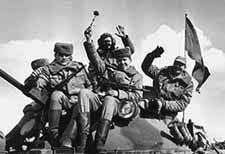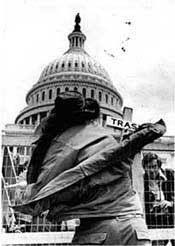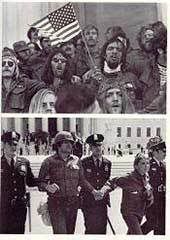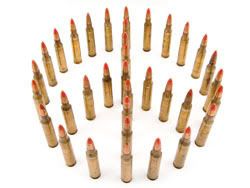 Sign up for their Newsletter or just save their site as a favorite and visit each week to find just abit of the Real History that helps bring about needed Change and Corrective Direction of a Country, World, and Democracies, forcing Democracies to become so and maintain their Freedoms.
Sign up for their Newsletter or just save their site as a favorite and visit each week to find just abit of the Real History that helps bring about needed Change and Corrective Direction of a Country, World, and Democracies, forcing Democracies to become so and maintain their Freedoms.
You can find this weeks newsletter here of which I’ve borrowed a few moments of to pass on to you, below.
 April 14, 1988
April 14, 1988
The Soviet Union signed an agreement pledging to withdraw its troops from Afghanistan after ten years. The pact, drawn up in negotiations between the United States, the USSR, Pakistan and Afghanistan, was signed at a United Nations ceremony in the Swiss capital of Geneva.
 April 15, 1967
April 15, 1967
Amidst growing opposition to the war in Vietnam, large-scale anti-war protests were held in New York, San Francisco and other cities. In New York, the protest began in Central Park, where over 150 draft cards were burned, and included a march to the United Nations led by Rev. Martin Luther King, Jr.

 April 16, 1971
April 16, 1971
Members of Vietnam Veterans Against the War (VVAW) threw medals they had earned in Vietnam on the U.S. Capitol steps in protest of the Vietnam War.
 April 17, 1960
April 17, 1960
Inspired by the Greensboro sit-in by four black college students at an all-white lunch counter, nearly 150 black students from nine states formed the Student Nonviolent Coordinating Committee (SNCC). Meeting in Raleigh, North Carolina, with Ella Baker, James Lawson and Martin Luther King, Jr., the founders set SNCC’s initial goals as overturning segregation in the South and giving young blacks a stronger voice in the civil rights movement. By that time, in mid-April 1960, 50,000 or more students had participated in sit-ins over just the previous three months.
At the Raleigh conference Guy Carawan sang a new version of “We Shall Overcome,” an adaptation of an old labor song. This song would become the national anthem of the civil rights movement. People joined hands and gently swayed in time singing “black and white together,” repeating over and over, “Deep in my heart, I do believe, we shall overcome some day.”
History of SNCC*****SNCC website
They have a few Historical events for April 17. The above is one of many events, in the civil rights movement that moved this Country in the Right Direction, but in many ways we haven’t reached the goals We As A Democracy of Freedoms that should be the Natural of our Culture, as we Preach to Others about Democracy and Freedom, and Today We Bomb Others In The Name Of Democracy And Freedom! {Think they’ll accept? Think Again!}
 April 18, 1912
April 18, 1912
Members of the United Mine Workers of America on Paint Creek in Kanawha County, West Virginia, demanded wages equal to those of other area mines. The operators rejected the wage increase and miners walked off the job. Miners along nearby Cabin Creek, having previously lost their union, joined the Paint Creek strikers and demanded:
• the right to organize
• recognition of their constitutional rights to free speech and assembly
• an end to blacklisting union organizers
• alternatives to company stores
• an end to the practice of using mine guards
• prohibition of cribbing
• installation of scales at all mines for accurately weighing coal
• unions be allowed to hire their own checkweighmen to make sure the companies’ checkweighmen were not cheating the miners.
When the strike began, operators brought in mine guards from the Baldwin-Felts Detective Agency to evict miners and their families from company houses. The evicted miners set up tent colonies and lived in other makeshift housing. The mine guards’ primary responsibility was to break the strike by making the lives of the miners as uncomfortable as possible.
Mine workers came along way but also not as far as they should have. We’ve seen what the power of greed and collaboration between mine owners and goverment representatives have brought forth in these last few years, mine collapses with numbers of deaths, mountaintop mining which is destroying this countries natural enviroment and natural beauty doing extreme damage to the surrounding enviroment as well. And it isn’t only in the mining industry, it’s across the board for the once Proud Hard Working middle class Americans, as we’ve rapidly moved towards a slave labor mentality, with the wealthy gaining wealth well beyond any individual need and those who reap that wealth for them sliding backward in wages and benefits!
 The Spirit of Solidarity — a $1.3 million granite sculpture, plaza and fountain — sits on the land of the Gerald Ford Presidential Museum on the banks of the Grand River near the Indian mounds
The Spirit of Solidarity — a $1.3 million granite sculpture, plaza and fountain — sits on the land of the Gerald Ford Presidential Museum on the banks of the Grand River near the Indian mounds
April 19, 1911
More than 6,000 Grand Rapids, Michigan, furniture workers – Germans, Dutch, Lithuanians, and Poles – put down their tools and struck 59 factories in what became known as the Great Furniture Strike.
For four months they campaigned and picketed for higher pay, shorter hours, and an end to the piecework pay system that was common in the plants of America’s “Furniture City.” Although the strike ended after four months without a resolution, Gordon Olson, Grand Rapids city historian emeritus, said once employees returned to work most owners did increase pay and reduce hours.
Also on April 19 but in 1971
 As a prelude to a massive anti-war protest, Vietnam Veterans Against the War (VVAW) began a five-day demonstration in Washington, D.C. The generally peaceful protest was called Dewey Canyon III in honor of the operation of the same name conducted in Laos. They lobbied their congressmen, laid wreaths in Arlington National Cemetery, and staged mock “search-and-destroy” missions.
As a prelude to a massive anti-war protest, Vietnam Veterans Against the War (VVAW) began a five-day demonstration in Washington, D.C. The generally peaceful protest was called Dewey Canyon III in honor of the operation of the same name conducted in Laos. They lobbied their congressmen, laid wreaths in Arlington National Cemetery, and staged mock “search-and-destroy” missions.
Led by Gold Star Mothers (mothers of soldiers killed in war), more than 1,100 veterans marched across the Lincoln Memorial Bridge to the Arlington Cemetery gate, just beneath the Tomb of the Unknown Soldier. A memorial service for their peers was conducted by Reverend Jackson H. Day, who had just a few days earlier resigned his military chaplainship. In addition to his passages of scripture and citations of poetry was a personal statement, including the following:

 April 20, 1853
April 20, 1853
Harriet Tubman began her Underground Railroad, a network of people and places that aided in the escape of slaves to the north.
read a brief biography of Harriet Tubman
Visit the Newsletter site page for more
 Bullets aren’t used to Force Others into Democracy and Freedom, the Freedom is within, the Democracy comes from that!
Bullets aren’t used to Force Others into Democracy and Freedom, the Freedom is within, the Democracy comes from that!
Bullets should Only Be Used as an Absolute Last Resort to Quell Violence and help maintain a Peaceful Order directly after as the people workout their differances, and Wars Of Choice should be Globally Condemned with those forcing others into Brought To Justice as Criminals Against Humankind!!

2 comments
Author
Rock Richard, military and just returned from a tour in Afganistan, has a post up over at ‘Vet Voice’
Fort Bragg Behavioral Health: “Don’t call us, we’ll call you”
Needs some Contacts made to our powers that be, or those that think they rule!!
This BullS**t Has Got To Stop, though we said that in the ‘Nam Years and it hasn’t improved much at all!
And thanks for the links!
The struggle of people against power is the struggle of memory against forgetting. —Milan Kundera